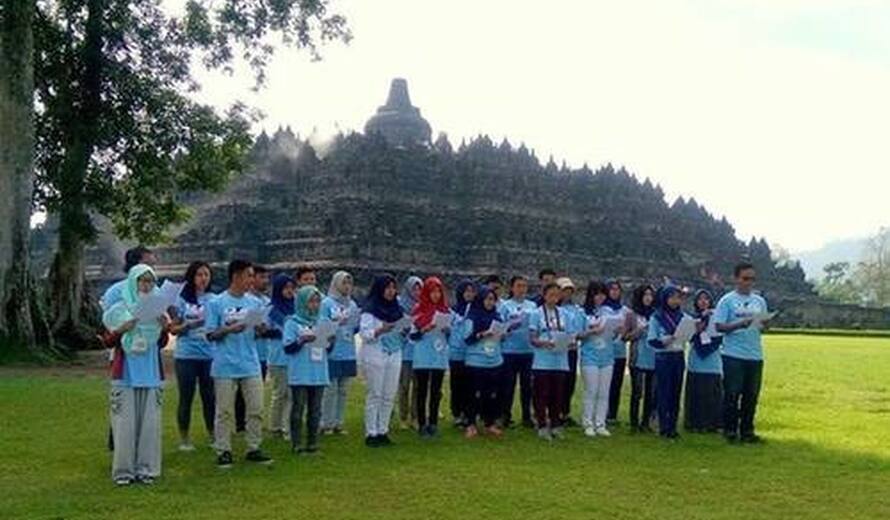UNESCO Jakarta supports implementation of World Heritage Camp Indonesia 2016
Within the framework of the Heritage Education Program, the Directorate of Heritage and Cultural Diplomacy (Ministry of Education and Culture, Directorate General of Culture) conducted the World Heritage Camp Indonesia (WHCI) 2016 from 8 to 14 November.
The seven-day forum was held across three World Heritage Sites in Indonesia – Sangiran Early Man Site, Prambanan Temple Compounds, and Borobudur Temple Compounds – and aimed to increase youth awareness with regard to the importance of such sites by providing an understanding of World Heritage and the issues surrounding its protection. The forum had three main objectives: (1) For youth to recognize and understand the basic concepts of World Heritage preservation, particularly Cultural World Heritage; (2) to increase youth involvement in protecting and promoting Indonesian heritage; and (3) for youth to understand the implementation process and challenges of managing and utilizing Indonesia’s World Heritage.

During this camp, participants conducted classroom activities, visited the three World Heritage sites along with the site managers, and engaged in group discussions and hands-on work that focused on designing programs within the community empowerment/heritage preservation campaign.
In addition to these activities, the WHCI participants were also provided with the opportunity to learn about intangible heritage by way of a traditional dance called Kipas Asri, which was performed during a Ramayana Ballet performance held on Saturday, 12 November at the Ramayana Theatre, Prambanan Temple.

The participants also heard from several guest speakers during their classroom learning sessions. The presenters were Mr. Daud Aris Tanudirjo (expert from Gajah Mada University), Mr. Andri Purnomo (heritage expert from the Satya Wacana Christian University), Mr. Doddy Wiranto (representative from the Conservation Office of Sangiran Early Man Site), Mr. Gatot Gautama (heritage expert), Mr. Marsis Sutopo (Head of the Borobudur Conservation Office), Diana Setiawati (UNESCO Office Jakarta), Mr. Dananjaya Axioma (representative from the Ministry of Tourism), Mr. Arief Rachman (Executive Chairman of the Indonesian National Commission of UNESCO), and Mr. Leo Mokodompit (former Head of Youth Desk, Indonesian National Commission for UNESCO). In particular, UNESCO Jakarta presented a session entitled “Youth Contribution to the Cultural Heritage Preservation of Indonesia,” which attracted the interest of participants.

Forty-four youths from across Indonesia participated in the forum, which was facilitated by Ms. Cilik Tripamungkas (UNESCO Jakarta) and supported by youth representatives from Dejavato, Young Guardian Club (YGC), and Indonesia International Work Camp (IIWC) under the supervision of Mr. Yunus Arbi, the Head of the Sub-Directorate of World Tangible Heritage Affairs, Directorate of Heritage and Cultural Diplomacy (Ministry of Education and Culture, Directorate General of Culture). Mr Yunus stated that the forum is expected to foster shared responsibility among young people in protecting national heritage in a global way.
To mark the end of the youth forum, participants gathered together to read the WHCI 2016 declaration at the Borobudur Temple Compounds. Within the declaration, the youth participants stated their commitment to continue to promote cultural heritage, support the government in the World Heritage Tentative List preparation process, create a youth community focused on heritage, and encourage educators and academics to include World Heritage within their school or college lessons/educational activities.
